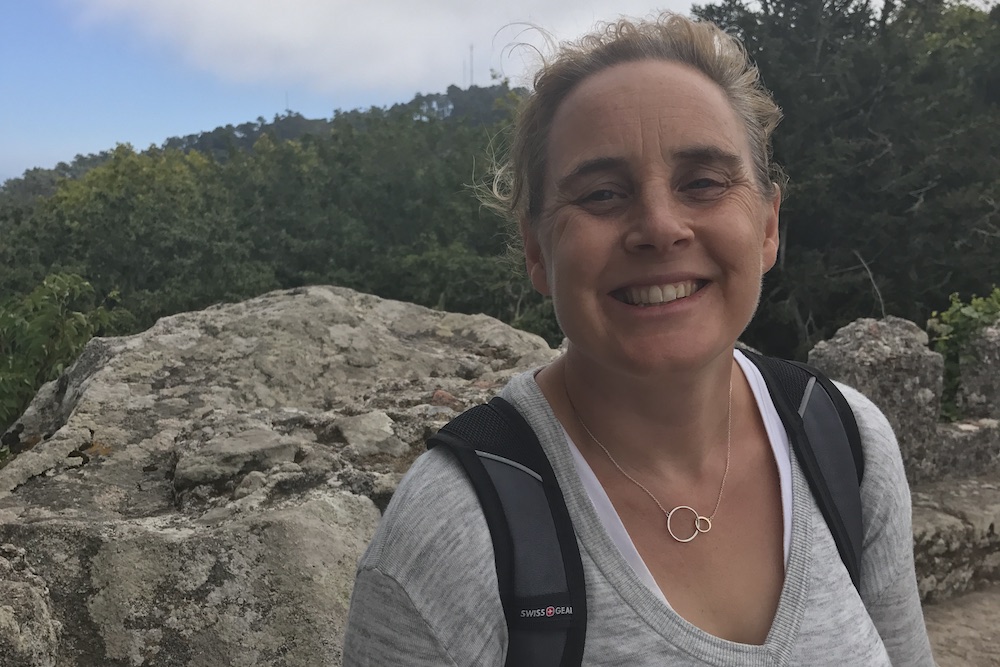
Courtesy of Jessica Garrison.
Jessica Garrison is a senior investigative editor for BuzzFeed News and the author of The Devil’s Harvest: A Ruthless Killer, a Terrorized Community, and the Search for Justice in California’s Central Valley. Before participating in a Zócalo event asking, “Why Is It so Easy to Get Away With Murder?,” she stopped by the virtual green room to talk about why she loves taking the train through the Central Valley, the time she was convinced there was a worldwide shortage of dirt, and how she handles tough reporting assignments.
How do you procrastinate?
I decide that I must know the answer to certain questions. Like—I cannot continue until I find out whatever the completely not important thing is that I need to know.
What’s one of your biggest pet peeves when it comes to editing?
Like every writer, usually the first sign that an edit is good is how angry I am about it. If I get the edit, and I’m like, “This is outrageous. This is wrong. This is terrible,” I have learned to be like, OK, wait 24 hours, and you might find that it’s right.
So I think the biggest pet peeve—and again, it is also the best thing about being edited—is when someone points out something to you that really needs work.
The biggest pet peeve when I am editing—this is way more than a pet peeve—is when you realize halfway through an edit that the thing you’ve come up with doesn’t work.
Do you have a favorite place to stop along the 99?
I have quite a few. The one that broke my heart was that Basque restaurant in Bakersfield that just went under during the pandemic. [I enjoy traveling the route by] train because when I was doing book research, I could work on the train all the way down and all the way up.
The moment when you get south of Fresno in the winter and you look up, and you see the mountains, and they’re sparkling in the snow—that is one of my favorite moments. And then there’s just really delicious food everywhere if you look for it.
What’s the most intimidating interview you’ve conducted?
There is the time that Kim Christensen—who is one of the best reporters in the universe—and I were doing a story and a city official briefly brainwashed both of us and convinced us that there was a worldwide shortage of dirt. And we were absolutely like, “Oh my gosh. Maybe that’s the story.” I think we got all the way back to our editor, and we’re like, “Whatever we’re working on, the thing now is the worldwide shortage of dirt.” And our editor looked at us like, “I’m sorry, what?”
You report on a lot of tough subjects. How do you maintain your sanity when you’re in the weeds on a particularly disturbing story?
This book is really, really dark. And one of my favorite Amazon reviews of this book—not that I ever read my Amazon reviews—was somebody who was like, “You can tell a chick wrote this because there’s just not enough gore and violence.” Something like that. I think that in this book I was really focused on a question, “How is this allowed to happen?,” and less on the gore and violence of the actual story.
Some of the other work I’ve done has been about people who are really stuck. I think that’s really hard, especially because sometimes you think of journalism like if you shine a light on something it will get better. And that is just really not always true.
You have to believe in what you’re doing, right? You have to believe that getting people to tell you their stories, that there is some value to it and some value to telling their stories. I really hope and believe that’s true. I don’t think you could do this if you didn’t believe that.
What was your favorite class at Berkeley?
My senior year I took only classes that my dog could also take, which, you know, as an educational strategy, wasn’t great. [But I had gotten the dog because] I was hiking alone and was accosted by somebody. My solution to it was to get a big dog, because I didn’t want to stop hiking.
Anyway, there I was, and I had this ridiculous dog who had separation anxiety. My roommates were like, “Absolutely, you will not be leaving this dog in the apartment.” So I only took classes the dog could also take, which is how I met my husband—he liked the dog.
What do you miss about living in Los Angeles?
First of all, the people. There are so many people there I love and it breaks my heart not to be able to see them. And so many kids that my kids knew growing up. And I miss the food. I really miss the food. And the light in the afternoon. I just miss the L.A.-ness of it all, too. The way the chaos works.
If you weren’t a journalist what would you be?
Young me probably would have been a lawyer or a teacher. For a long time thought I wanted to be a teacher and I kept applying for teaching jobs and journalism jobs, and I kept getting journalism jobs first.
Old me—I don’t know, maybe something totally different, like a park ranger.
What’s hanging on your refrigerator?
Our refrigerator just broke and we just got a new one, and there’s nothing on it. It is clean. It’s amazing.
Last question: What got you through election week?
Fortunately or unfortunately, I was working the whole damn time because I was editing stories. That was both a blessing and a curse.



